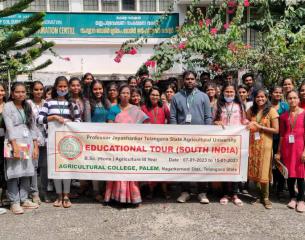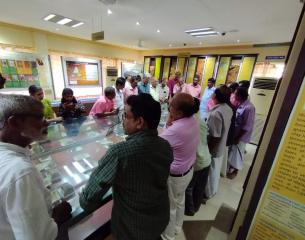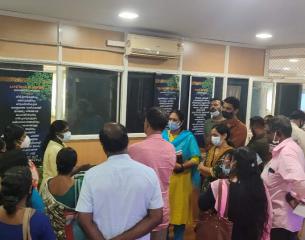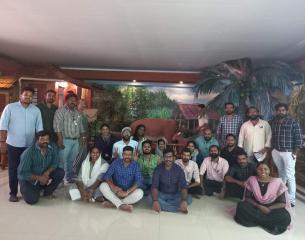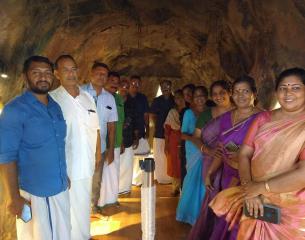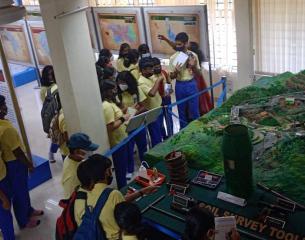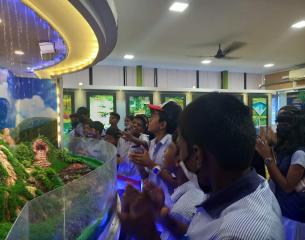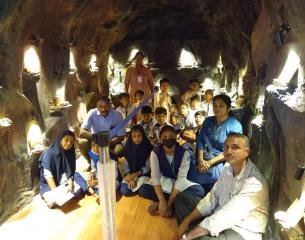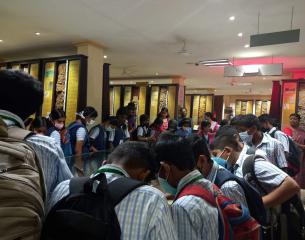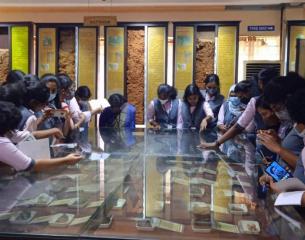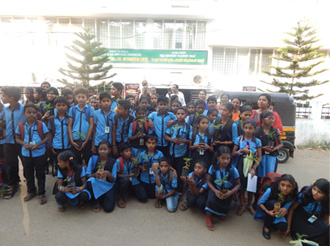
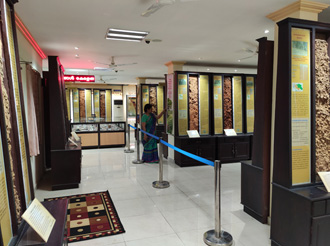


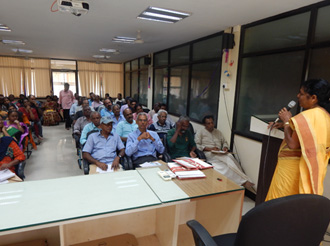
|
Contact – Principal Soil Chemist Central Soil Analytical lab Parottukonam Thiruvananthapuram Phone no - 0471 2541776 email - psc.csal@gmail.com |
In tune with the growing concerns in the natural resource management front, Kerala government entrusted the establishment of a State Soil Museum to the Department of Soil Survey & Soil Conservation. The Department of Soil Survey and Soil Conservation is the premier institution dealing exclusively on soils of the State. Soil survey activities have helped to identify soils that occur extensively and that have special significance. The Soil Museum is an attempt to bring all these soils and their live models under one roof. Soil Museum and Soil Information Centre is established in the first floor of the Central Soil Analytical Laboratory at Parottukonam, Thiruvananthapuram. This museum is therefore the first of its kind in the world with the largest collection of soil monoliths and display materials. Potential user groups of soil museum would include farmers, soil scientists, research scholars, planners, administrators, students, extension personnel, non- governmental organizations and general public.
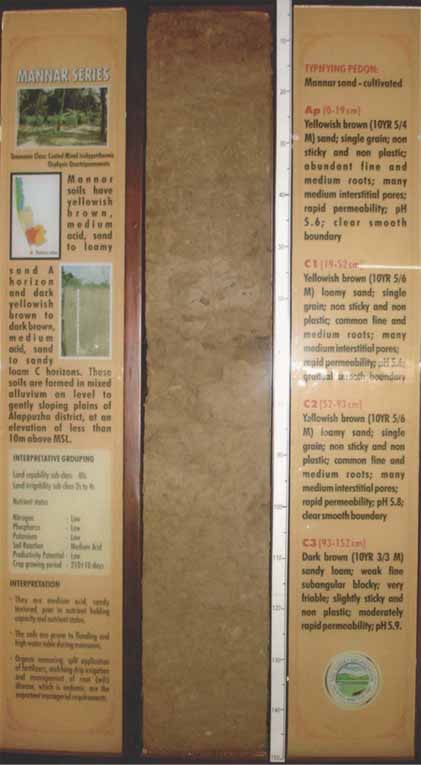 OBJECTIVES
OBJECTIVES
- Reference centre on the Soils of Kerala
- Display of soil monoliths of the Bench Mark Soils of the Major land Resource Areas of all districts
- Display of rocks and minerals of the State
- Reference base for planning and undertaking soil series based agricultural research activities in the State
- Mini theatre for providing information on soils and environmental issues at State and National Level through video shows
- Soil Information Centre displaying soil maps, watershed maps and related maps of all districts
- Display of watershed model, the basic unit of all developmental programs, and models of different soil and water conservation structures
BENCH MARK SOILS
Eighty two Bench Mark soils have been identified in the 27 different Major Land Resource Areas of Kerala for which soil monoliths were collected. A Bench Mark Soil is one that is widely extensive, holds a key position in the soil classification system and is of special significance to farming, engineering or other uses. The basic objective of Bench Mark Soil is to focus attention on extensively occurring soils and their agronomic concepts for wider acceptability of interpretations and for extrapolation of research data. The Bench Mark Soils are selected from among the existing and established soils that represent typical range of soil conditions within the state and having extensive coverage. It is the representative of the most extensive soils in major land resource area or agro ecological zone of the state and/or holding a key position in Soil Taxonomy. The selected soil should have large amount of research data for making transfer of agro technology feasible. Studies of Bench Mark Soils helps in soil correlation, standardization of legends, prediction of soil behaviour, agro technology transfer and planning further research in allied disciplines.
SOIL MONOLITHS
A Soil Monolith is a sample of a soil profile with undisturbed structure, including several or all the basic genetic horizons. The soil monoliths in the soil museum are arranged district-wise and based on Major land Resource Areas (MLRA’s). Detailed information on soil series, their classification (Soil Taxonomy, 1994), landscape, crops, climate, typical profile characteristics fertility status etc are displayed. A table showing the list of Bench Mark Soils, their physiography and MLRA unit are given below.
|
|
Soil series |
Physiography |
|
|
THIRUVANANTHAPURAM DISTRICT |
|
|
1 |
Kazhakuttam series |
Lowland |
|
2 |
Amaravila series |
Lowland |
|
3 |
Vellayani series |
Midland |
|
4 |
Trivandrum series |
Midland |
|
6 |
Nedumangad series |
Midupland |
|
7 |
Kallar series |
Midupland |
|
8 |
Ponmudi series |
Highland |
|
|
KOLLAM DISTRICT |
|
|
9 |
Neendakara series |
Lowland |
|
10 |
Varkala series |
Midland |
|
11 |
Sooranad series |
Midland |
|
12 |
Mylom series |
Midland |
|
13 |
Ummannoor series |
Midland |
|
14 |
Karavaloor series |
Midupland |
|
PATHANAMTHITTA DISTRICT |
|
|
|
15 |
Airavan series |
Midland |
|
16 |
Adoor series |
Midland |
|
17 |
Ayroor series |
Midland |
|
18 |
Kumaranperur series |
Midupland |
|
19 |
Gudarakal series |
Highland |
|
|
ALAPPUZHA DISTRICT |
|
|
20 |
Alappuzha series |
Lowland |
|
21 |
Punnapra series |
Lowland |
|
22 |
Purakkad series |
Lowland |
|
23 |
Champakulam series |
Lowland |
|
24 |
Mannar series |
Lowland |
|
|
KOTTAYAM DISTRICT |
|
|
25 |
Manjoor series |
Lowland |
|
26 |
Parampuzha series |
Midland |
|
27 |
Kottappuram series |
Midland |
|
28 |
Paippara series |
Midupland |
|
29 |
Nellapara series |
Upland |
|
|
IDUKKI DISTRICT |
|
|
30 |
Manakkad series |
Midland |
|
31 |
Thommankuthu series |
Upland |
|
32 |
Chinnar series |
Highland |
|
33 |
Venmani series |
Highland |
|
34 |
Pampadumpara series |
Highland |
|
35 |
Anamudi series |
Mountainous |
|
|
ERNAKULAM DISTRICT |
|
|
36 |
Udayamperoor series |
Lowland |
|
37 |
Vypeen series |
Lowland |
|
38 |
Ikkaranad series |
Midland |
|
39 |
Punnamattom series |
Midland |
|
40 |
Perumbavoor series |
Midland |
|
41 |
Odakkali series |
Midupland |
|
|
THRISSUR DISTRICT |
|
|
42 |
Manathala series |
Lowland |
|
43 |
Konchira series |
Lowland |
|
44 |
Kizhapallikara series |
Midland |
|
45 |
Koratty series |
Midland |
|
46 |
Kozhukully series |
Midupland |
|
47 |
Painkulam series |
Upland |
|
|
PALAKKAD DISTRICT |
|
|
48 |
Thirunarayanapuram series |
Midland |
|
49 |
Karakurussi series |
Midland |
|
50 |
Mannur series |
Midland |
|
51 |
Bhavaji Nagar series |
Midupland |
|
52 |
Anuppur series |
Midupland |
|
53 |
Uthrampallam series |
Midupland |
|
54 |
Agali series |
Upland |
|
|
MALAPPURAM DISTRICT |
|
|
55 |
Triparangode series |
Lowland |
|
56 |
Angadipuram series |
Midland |
|
57 |
Naduvattom series |
Midupland |
|
58 |
Vazhikadavu series |
Midupland |
|
59 |
Mannamkulam series |
Upland |
|
60 |
Walakkad series |
Mountaineous |
|
|
WAYANAD DISTRICT |
|
|
61 |
Battuvady series |
Highland |
|
62 |
Pulpally series |
Highland |
|
63 |
Mananthavady series |
Highland |
|
64 |
Sulthan Bathery series |
Highland |
|
65 |
Periya series |
Highland |
|
66 |
Meppadi series |
Mountaineous |
|
|
KOZHIKODE DISTRICT |
|
|
67 |
Elathur series |
Lowland |
|
68 |
Chelapram series |
Lowland |
|
69 |
Kakkodi series |
Midland |
|
70 |
Nanminda series |
Midland |
|
71 |
Kunnamangalam series |
Midland |
|
72 |
Thruvampadi series |
Midupland |
|
|
KANNUR DISTRICT |
|
|
73 |
Narikkot series |
Lowland |
|
74 |
Kunhimangalam series |
Lowland |
|
74 |
Arathil series |
Midland |
|
75 |
Kolikkadavu series |
Midupland |
|
76 |
Wanjiyam series |
Upland |
|
77 |
Kunnathuru series |
Highland |
|
|
KASARGOD DISTRICT |
|
|
78 |
Hosdurg series |
Lowland |
|
79 |
Thekkila series |
Midland |
|
80 |
Edanad series |
Midupland |
|
81 |
Payalam series |
Upland |
|
82 |
Maloth series |
Upland |
ROCKS AND MINERALS
The common rocks and minerals seen in Kerala are displayed in the soil museum
SOIL INFORMATION CENTRE
Soil Information Centre is intended as a documentation and reference centre on the soils of Kerala. The center provides soil information in the form of hard copy, digital files of published maps and reports. The access and query facility on the soils of Kerala provides a detailed description on soil types, their limitations, ameliorative meaures etc. The success stories in the soil conservation front are also available for reference in the library.
WATERSHED MODEL
1. The word ‘watershed’ is derived from German ‘Wasserscheide’: wasser (water) & scheide (divide / parting)
1. Watershed is defined as a geo-hydrological unit draining to a common point by a system of drains. It is an area of land and water bounded by a drainage divide within which the surface run-off collects and flows out through a single outlet into a larger river or lake.
2. Each watershed is divided from the adjacent watersheds by a drainage divide usually the high elevation perimeter of that area (ridge line).
3. Size of the watershed depends upon the area covered by the selected drainage line, whereby smaller streams result in small area watersheds and larger streams give rise to larger area of the watersheds.
4. Watersheds are seen in different shapes. Circular, square, rectangle, oval, triangle etc are the common shapes identified.
Presently, the watershed is the basic unit for implementation and development of all agricultural schemes. A watershed model is displayed to highlight the concepts of watershed delineation and integrated management.
MINI THEATRE
The mini theatre shows videos on soil survey and soil conservation activities in the State. The state of the planet is documentarised stressing the need for conservation activities. The soil perspective is highlighted in all videos. Videos on environmental concerns are also shown.
SOIL AND WATER CONSERVATION MODELS
Soil and water conservation practices are highlighted through models. Detailed descriptions are also displayed.
DISTRICT-WISE SOIL AND WATERSHED MAPS
Display and documentation materials on Geology of Kerala, geological time periods, physiography, soils of kerala, watersheds of all 14 districts are put up. The departmental activites are also shown. The output of field soil survey activities is inventory reports and maps. The reconnissance soil survey maps of all districts in 1:50,000 scale is displayed along with prioritized district-wise microwatershed atlas. Each soil map gives the soil associations encountered in each district along with their physiography. The watershed atlas is prioritized, delineated and codified at micro level for use of local self government institutions.
| Entry fee | |
| School students | - Rs. 15/- |
| College students | – Rs. 20/- |
| General Public | – Rs.30/- |

